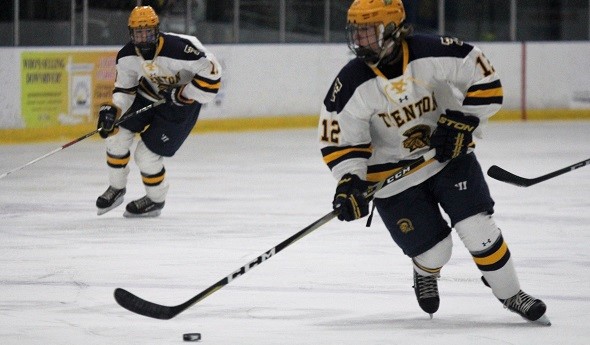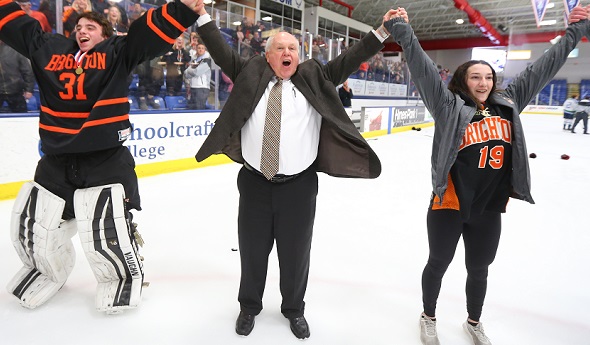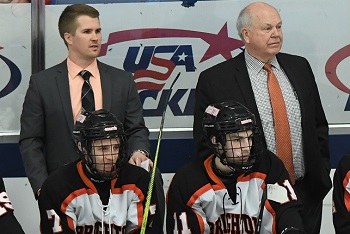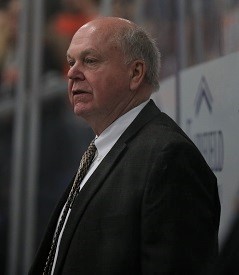
Tradition, Community Drive Talented Trenton
By
Tom Markowski
Special for Second Half
December 14, 2017
TRENTON – There’s something special about the sport of ice hockey in Trenton. There are those who would contend, at the high school level, that Trenton is Hockeytown.
 Trenton has won 14 MHSAA titles, second only to Bloomfield Hills Cranbrook Kingswood’s 17. But the importance of hockey in this downriver community goes beyond winning on the ice. The sport transcends the ice to the lives of people who have never laced up skates.
Trenton has won 14 MHSAA titles, second only to Bloomfield Hills Cranbrook Kingswood’s 17. But the importance of hockey in this downriver community goes beyond winning on the ice. The sport transcends the ice to the lives of people who have never laced up skates.
Chad Clements has experienced this firsthand, first as a fan, then as a player and now as a coach.
Clements was a junior on the 1996 Class A championship team. He also played on two other teams (1995, 1997) that reached the Finals.
Clements played for legendary coach Mike Turner, and it was Clements who replaced Turner in 2014 when Turner retired.
Replacing someone who gave so much to the sport and the Trenton community would be a no-win situation for some. It’s often been said that you don’t want to replace a legend. You want to be that coach who replaced the guy who replaced the legend.
Not Clements. He spent 12 seasons as Turner’s assistant and had no doubts he was the right person for the job.
And Clements was not alone. Turner backed Clements, and so did the administration.
Dr. Michael Doyle is in his 13th year as principal at Trenton High and he had no second thoughts about whom his school district should hire to replace Turner.
“Chad is an educator, a true educator, on the ice and in the classroom,” Doyle said. “That was critical (in the hiring process). He knows his stuff. He’s a great teacher. He’s passionate. You keep it in the family, yes, but when the job opened up, he was the perfect fit.
“(And) as a principal, it’s so helpful to have coaches in the building.”
This is Clements’ 16th season coaching at Trenton, and it’s his 16th year teaching social studies at the high school. A graduate of Michigan State University, Clements, 38, has been groomed for his place in the community.
 “As a player, I always had great respect for (Turner),” Clements said. “His son was a year older than me, and he played with my brother who was two years older than me. So I knew (Turner) at an early age. It was always ‘yes sir’ and ‘no sir’ when I was around him. He was a quiet guy, at that time, around me. Then my senior year he opened up to me, as a person. He asked me what I was I going to do. What plans did I have for college and after? So when I came back (to teach and coach), I remembered that.
“As a player, I always had great respect for (Turner),” Clements said. “His son was a year older than me, and he played with my brother who was two years older than me. So I knew (Turner) at an early age. It was always ‘yes sir’ and ‘no sir’ when I was around him. He was a quiet guy, at that time, around me. Then my senior year he opened up to me, as a person. He asked me what I was I going to do. What plans did I have for college and after? So when I came back (to teach and coach), I remembered that.
“For me, as a coach, (our relationship) was completely different. Behind closed doors he’d talk and talk and talk about hockey and his family, and I never expected that.
“We’ve been close ever since.”
Turner holds the state record for career hockey coaching victories at 629. He began coaching in 1974, took some time away from the game following the 1981 season and returned to coaching in 1995, Clements’ first season on varsity. Of the program’s 14 MHSAA titles, Turner was on the bench for 11.
Clements said he and Turner talk at least once a week, about hockey and life in general. Turner travels extensively now, to Europe and throughout the U.S., and much of their conversations include capsules of the many sites Turner has seen. But when he’s back in the area, Turner is often seen at Trenton hockey games.
In many ways Clements is the right person at the right time for the program. He knows the expectations are high, yet at the same time he doesn’t place added pressure on himself to win. He was taught that if you do your best, by putting in the time and the work, then you can go home at night, look at yourself in the mirror and be satisfied with the results.
The results have been quite positive so far this season. The Trojans are 5-2 with losses to Detroit Catholic Central and Bloomfield Hills Cranbrook Kingswood, two of the top teams in Division 1. Trenton, which will compete in Division 2, has defeated reigning Division 2 champion Birmingham Brother Rice (4-1).
“I’m surprisingly happy with our start,” Clements said. “I knew we would be young. I didn’t know what the expectations would be. I wouldn’t expect to be 5-2 after seven games, I’ll tell you that. The kids just keep working and working and working. We lost a tough one against Cranbrook in overtime, but the kids bounced back.”
Trenton has received a big boost from sophomore goaltender Joey Cormier. The Trojans would be lost without him – if for no other reason than Cormier is the lone goaltender of the roster. Another goalie will back up Cormier, but he won’t be eligible until the second semester.
“I told (Cormier), you’re my guy,” Clements said. “He’s given us a chance to win in every game.”
Last season was a disappointment for Clements and his team. The Trojans were defeated in a Pre-Regional by Livonia Churchill, 4-3 in overtime, and senior center Drew Welsch said some of the problems were internal. His team also is welcoming back the support from classmates.
“We lost our fan base,” he said. “We’re getting more support this season. We got our band back. … I’m good friends with the guys who get the student section going at games, and me and the other seniors are trying to get more to come out. So far it’s been fun. There’s nothing better than playing before a big crowd.”
 The Trenton community’s passion for its hockey program certainly is a difference-maker. Some of the state’s top hockey players choose to play travel hockey rather than for their schools. On the travel circuit, players get more games, and against stronger competition.
The Trenton community’s passion for its hockey program certainly is a difference-maker. Some of the state’s top hockey players choose to play travel hockey rather than for their schools. On the travel circuit, players get more games, and against stronger competition.
But fewer fans, mostly family members, attend travel hockey games. School spirit doesn’t exist. And for Welsch, Trenton’s leading scorer last season and so far this winter, the trade-off isn’t worth it.
“This is my favorite team I’ve been a part of,” he said. “It’s the tradition. There’s not a team I’d rather play for.”
It’s a two-way street. The players receive the acclaim from the student body and the community, and they give back, too.
For the past month the players have been collecting cans to raise money to give to a needy family in Trenton for Christmas. The holiday came early this past Sunday for a single parent and her two children when the players presented her with $1,000 worth of gifts including clothes, food, a Lego set, a tablet, and gift cards.
“The support we get is awesome,” Welsch said. “I like doing it. They support us. We have to help them out in any way we can.”
That’s the way it is in Trenton. You grow up there, you go to school there and many, like Clements, return home to work there.
“Community, that’s what we try to sell,” he said. “Whether it’s your classmates in the crowd and when you get a teacher or a staff member there, it means a lot to these guys. To see your teacher in the stands, taking two or three hours out of their lives to watch you play, it means so much. Heck, we’ve had the mayor come out and firemen and police officers. I’ve been able to establish relationships. It’s nice to have that.”
 Tom Markowski is a columnist and directs website coverage for the State Champs! Sports Network. He previously covered primarily high school sports for the The Detroit News from 1984-2014, focusing on the Detroit area and contributing to statewide coverage of football and basketball. Contact him at [email protected] with story ideas for Oakland, Macomb and Wayne counties.
Tom Markowski is a columnist and directs website coverage for the State Champs! Sports Network. He previously covered primarily high school sports for the The Detroit News from 1984-2014, focusing on the Detroit area and contributing to statewide coverage of football and basketball. Contact him at [email protected] with story ideas for Oakland, Macomb and Wayne counties.
PHOTOS: (Top) Trenton’s Drew Welsch (12) moves the puck up ice with a teammate trailing. (Middle) Goalie Joey Cormier has been an anchor in net for the Trojans. (Below) Trenton’s players also took time this winter to bring an early Christmas to a local family. (Photos by Christine Stawowczyk.)

Brighton Coach's Impact 'Immeasurable'
By
Tim Robinson
Special for MHSAA.com
October 7, 2020
By Tim Robinson
Special for Second Half
Paul Moggach has never been much for looking back.
 And as he begins his first season away from the Brighton hockey program in more than three decades, he’s still looking ahead.
And as he begins his first season away from the Brighton hockey program in more than three decades, he’s still looking ahead.
“I’m thinking about what I’m going to miss more than the mark I left,” he said in a phone conversation last week. “I guess I enjoyed so much of the time I had, the opportunity to coach at Brighton, I’m thinking more how I fill the time and the things I'll miss.”
Moggach (pronounced MUG-uth) retired as Brighton’s coach this past summer after 25 seasons and having led five teams to MHSAA Division 1 championships. He compiled a record of 466-172-47 during that period.
But that’s not what he remembers most, nor why he wants people to remember him.
“I would like them to remember the teams and players who played for me and my assistants, more than me,” Moggach said. “We have so many blessings and opportunities in our lives, and hockey was one for me and hopefully for the players and assistants I worked with.”
One of those assistants was Kurt Kivisto, who joined the Bulldogs originally as a team manager more than 20 years ago and was a player at Brighton. He eventually won a national championship at Michigan State before rejoining the program as an assistant coach a decade ago.
“The No. 1 thing I’ll take from him is sticking by your beliefs and not sacrificing those beliefs for the team,” said Kivisto, who was named Moggach’s successor in September. “He sticks by those beliefs and ... he’s not willing to sacrifice that even if it could hurt the team. The character and integrity he has, how he treats people with fairness and what he believes is right is the biggest thing I’ll take.”
A stepson, Damon Whitten, played for Moggach at Brighton and at MSU before becoming an assistant coach and eventually the head coach at Lake Superior State, where he is in his eighth season.
Asked about Moggach’s impact at Brighton, Whitten said, “I’m not sure you can measure it. Your mind goes to the hockey players who have come to Brighton, and that’s a big part. But I think it goes beyond that. The money they’ve raised over the years for different families in need, for example. He’s had a big impact, and the players he had were a big part of that, but it goes well beyond that, and he did it the right way. Thirty-plus years (in the program), and I’m not sure you can count more than a handful of times where he made a bad decision or handled things poorly. He did things the right way, every day, all of the time, and I think it’s why he was so successful for so long.”
 The team’s charitable works were mostly kept under the radar – Moggach’s reasoning being his players had been given much, it was their turn to give back, and he didn’t want people thinking they did those things for publicity.
The team’s charitable works were mostly kept under the radar – Moggach’s reasoning being his players had been given much, it was their turn to give back, and he didn’t want people thinking they did those things for publicity.
Moggach joined Rick Bourbonais as an assistant at Brighton in the mid-1980s, then switched roles with him for the 1996-97 season.
He realized Brighton’s potential in the 1992-93 season, when the Bulldogs upset perennial state power Trenton in the Class A Quarterfinals before losing to Detroit Catholic Central in a Semifinal.
“That, to me, said, at least in my mind, that we can do this,” Moggach said. “It’s not impossible.”
He slowly began to build the program, getting good players and a schedule that would challenge them.
“You get the players by building a good culture,” he said. “Back in the day, when I started, we weren’t very disciplined and our league wasn’t very disciplined. So I think we realized we had to build that, and I could have an influence on building that in Brighton.”
Along with the culture, Moggach looked for an edge whenever he could find it. He was talked into making a trip to the Keweenaw Peninsula by one of his player’s parents, and found enormous benefits for his team, both competitively and in team bonding.
“It’s a lot about the little things we do,” he said, “that we find joy in, and create those opportunities. Creating the little moments really can build to bigger moments. We played capture the flag one day in about two feet of snow.
“Almost killed them,” he added, chuckling. The exhausted players didn’t have much left for the game that night, but spending time together for four days in a bus and hotel room always brought the team closer on and off the ice.
That first UP expedition also led to more teams making the trip, for team bonding and a glimpse of a part of the state, and themselves, they might never have seen otherwise.
“We didn’t do that for long,” he said. “But we always came back saying we were better together because of that experience.”
Bob Nelson had three sons play for Moggach, and Nelson’s wife, Kris, was president of the team’s booster club during their involvement over nearly a decade in Brighton hockey. Nelson also coached the program’s younger players for five seasons.
“We got to know the Moggachs really well,” he said. “It was a good experience, both as a coach and as a parent as well.”
Moggach introduced other things, including an emphasis on nutrition and off-ice training, that players resisted at first until they saw the benefits.
 He savored conversations with referees and opposing coaches before the games and even the occasional reporter after games.
He savored conversations with referees and opposing coaches before the games and even the occasional reporter after games.
But his first priority was the players. At times he would erupt in practice at a player or, more commonly, the team, and the boys soon learned to hear the message, not the volume. But for a couple of seasons, they also wrote some of his wilder statements down in a notebook after practice.
One year, they read some of them at the banquet, and after each one, Moggach’s wife, Sharon, would look at him and ask, “Did you really say that?”
Moggach would laugh and confess to remembering he had actually done so, then laughing.
“He knew part of what made the program good was his relationship to the players,” Nelson said. “If it was a good time, he wanted to enjoy it, even at his own expense at times.”
Moggach has staying in the background this offseason, letting Kivisto shape the team.
Asked if he were willing to fully switch coaching roles, as he and Bourbonais did a quarter-century ago, Moggach laughed.
“No,” he said emphatically. “Rick wasn’t in his 70s when we made the switch. Kurt needs his time. I’ll be there if he needs me.”
Moggach, who is 74, still works fulltime as the University of Michigan’s director of risk management.
He plans to spend more time with his wife and watch his grandsons play hockey, as well as catching some Lake Superior State games.
“I was really blessed to have Rick and Brownie (longtime assistant Mike Brown) along for the ride, and then to get Kurt involved,” Moggach said. “They weren’t the only ones, but they were the kids for me.
“The other thing is the support from the Brighton (High School) administration, the teachers, and our community. There are more people to thank than I could ever bring up. I do think that, all together, it was a great run. It couldn’t have been any better.”
PHOTOS: (Top) Recently-retired Brighton hockey coach Paul Moggach celebrates the 2018 Division 1 championship game win over Saginaw Heritage at USA Hockey Arena. (Middle) Former player Kurt Kivisto, left of Moggach during the 2018 Semifinal win over Detroit Catholic Central, served as an assistant before assuming the head coaching job in September. (Below) Brighton's 2018 championship was its fifth under Moggach. (Photos by Hockey Weekly Action Photos.)

